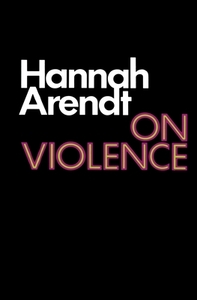Take a photo of a barcode or cover
reflective
medium-paced
Discovery of a very surprisingly conservative aspect of Arendt-with a very naive belief on the foundation of a republic
challenging
reflective
medium-paced
challenging
informative
reflective
fast-paced
an insightful exploration into the antithetical relationship between violence and power - power can't be born of violence alone - but really difficult to look past arendt's racist (and internally inconsistent) take on the Black power movement
challenging
dark
informative
reflective
medium-paced
Alright, I'm going to kick off this review dump with the most recent thing that I finished for school which was this 80 page political essay about the relationship between power and violence within a state and its citizens. This is undoubtedly the most interesting thing that I've read for this masters so far and barring Arendt's disregard for intersectionality and pretty racist takes on the potential for violence within the Civil Rights movement (and really... can we exclude that from her analysis? like, to what extent do we allow pop political figures from the past to be "products of their time"? Anyway, you could write countless essays about that alone so I'll move on) this is a really interesting and pretty clear cut take down of violence as a political tool of statecraft and I would actually really recommend giving it a read if you're ever in the mood for a little bit of political philosophy. We only technically had to read part two of this essay for class, the rest was on the "recommended but not required" section, but I'm glad I got to hear all of Arendt's thoughts in their entirety.
There's a part in this text (which, bear in mind, was written in the *1960s*) where she talks about the way young people caveat all of their future predictions with "well, if there is a future..." and while she's directly referencing the Cold War and the fear of nuclear war à la weapons of mass destruction, it's crazy how our generation has the same looming sense of dread and doom when it comes to the climate crisis. Just goes to show you that history is cyclical and humanity is always on course to destroy itself and ruin the psyches of its hopeful youths. *gives ironic thumbs up* thanks world.
Arendt's main point is that power requires buy-in from the public, a public who grants the state the authority to act on its behalf, and when leaders/states feel that they're losing their power/that the public is turning against them, they often resort to violence which completely violates the trust of the public and therefore ruins the governments chance of ever really getting power back. This idea, that violence as an instrument can serve as the inverse of power as opposed to the augmenter of power, is a really neat idea and I think there are a lot of contemporary on-the-nose case studies of leaders losing favor lashing out with violence to try and win back the support of the public (and failing). Russia, Israel, I mean, this book should be required reading for world leaders as a lesson of what not to do, I swear to god.
Anyway, this is a very long review for a very short book but alas, I had thoughts! so here they are. Not giving it a rating because I don't really know how I feel about that.
There's a part in this text (which, bear in mind, was written in the *1960s*) where she talks about the way young people caveat all of their future predictions with "well, if there is a future..." and while she's directly referencing the Cold War and the fear of nuclear war à la weapons of mass destruction, it's crazy how our generation has the same looming sense of dread and doom when it comes to the climate crisis. Just goes to show you that history is cyclical and humanity is always on course to destroy itself and ruin the psyches of its hopeful youths. *gives ironic thumbs up* thanks world.
Arendt's main point is that power requires buy-in from the public, a public who grants the state the authority to act on its behalf, and when leaders/states feel that they're losing their power/that the public is turning against them, they often resort to violence which completely violates the trust of the public and therefore ruins the governments chance of ever really getting power back. This idea, that violence as an instrument can serve as the inverse of power as opposed to the augmenter of power, is a really neat idea and I think there are a lot of contemporary on-the-nose case studies of leaders losing favor lashing out with violence to try and win back the support of the public (and failing). Russia, Israel, I mean, this book should be required reading for world leaders as a lesson of what not to do, I swear to god.
Anyway, this is a very long review for a very short book but alas, I had thoughts! so here they are. Not giving it a rating because I don't really know how I feel about that.
reflective
medium-paced
challenging
dark
hopeful
informative
inspiring
reflective
sad
tense
medium-paced
challenging
informative
reflective
slow-paced
challenging
informative
informative
reflective
slow-paced
challenging
informative
reflective
slow-paced
Very dense and complex for my little mind, i did not have half of her references nor was i familiar with the work of the people she cited nonetheless the parts with none of that were interesting and food for thoughts.




